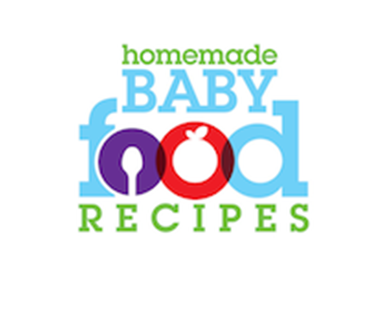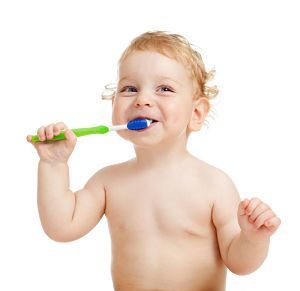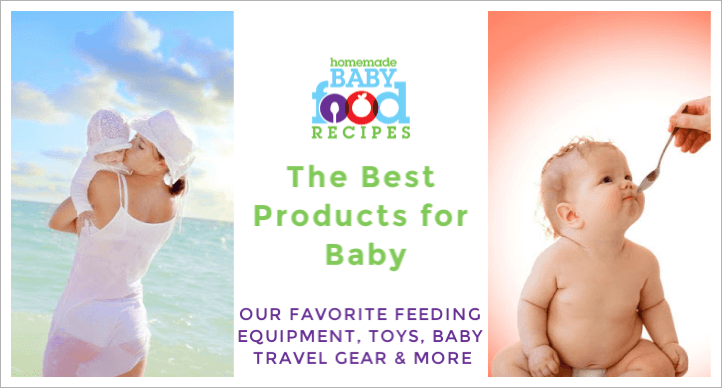Brushing Baby’s Teeth
Brushing baby’s teeth and paying close attention to his dental care is more important than many parents realize.
Keeping your baby’s teeth clean may not always be easy – when he clamps his jaws shut, it can be difficult to persuade him to open them – but getting a routine established early in life can make things easier later on!
Good dental care for babies should start from birth...
...when you can gently clean your baby's mouth using a soft, damp washcloth or a piece of damp gauze to remove any milk residue from his gums. Cleaning his mouth at this early stage will help him get accustomed to the whole procedure...meaning that he may not object too much when you introduce a toothbrush later on,
Once your baby’s first teeth begin to appear, then you should begin cleaning them very carefully, at least twice a day. The naturally occurring bacteria in your baby’s mouth change sugars from his food (including natural sugars) into acid. The enamel of your baby’s teeth may then be attacked by this acid.
why are baby teeth important?
It is as important to care for your baby’s first teeth as it is to care for his permanent teeth when he’s older. Yes – his baby teeth will fall out, but in the meantime they serve some important functions…
- Baby teeth are responsible for “reserving” spaces for the permanent teeth to grow into. When baby teeth are lost, it can cause the permanent teeth to shift – and this can cause orthodontic problems as your child grows.
- Your baby needs his milk teeth in order to learn to speak correctly and clearly.
- Your baby’s milk teeth are necessary for biting and chewing.
- If your child loses too many baby teeth, it can affect his confidence once he reaches pre-school. Sadly, children can be very unkind when it comes to pointing out differences in others.
tips for choosing a toothbrush
As soon as baby’s first tooth erupts, it’s time to buy a good toothbrush. The best type to use at first is a long handled brush with a small head. This design makes it easy to reach all areas of your baby’s mouth.
Your baby’s toothbrush should have rounded, soft filaments. You should replace it every 10-12 weeks, or sooner if the filaments become splayed.
Another option is to use a specially designed infant toothbrush that fits over your finger. Some babies seem to prefer this type… but beware! If your baby is a biter, a toothbrush of this type offers your vulnerable finger very little protection!
As your baby grows and wants to hold the brush himself, then it’s a good idea to buy him one with a chunky handle. This will be easier for him to hold – but, of course, you will still need to do the majority of the brushing yourself!
toothpaste and fluoride
It isn’t absolutely essential to use toothpaste to clean your baby’s teeth – the brushing action itself is actually the most important part of keeping them clean. If you prefer to use toothpaste, then you should choose one that is designed specifically for infants, because they contain very little – if any – fluoride. In fact, the American Association of Pediatric Dentistry guidelines suggest that babies under the age of 2 receive NO fluoride at all.
Fluoride helps strengthen the enamel of teeth. However, too much of it can cause fluorosis, which is a condition where white spots can appear on the permanent teeth. If you use an adult toothpaste to brush your baby’s teeth, which contains the amount of fluoride recommended for adults, you run the risk of him developing fluorosis. This is because babies tend to swallow rather a lot of toothpaste during brushing and are thereby swallowing excess fluoride.
For more information about your child’s fluoride requirements, you should speak to your dentist. You can also read the useful article Brushing Baby’s Teeth – How Much Fluoride Is Enough?
Tips for brushing baby’s teeth
- If your baby won’t open his mouth when it’s time to brush his teeth, then try putting a brush in YOUR mouth – babies love to mimic whatever Mum is doing!
- Open your mouth wide and sing a musical scale (we recommend trying this one in the privacy of your bathroom ONLY!). He will either try to copy your singing – or he will laugh – but either way, he will have opened his mouth!
- Sit your baby in the most comfortable position for both of you – try standing or sitting behind your baby as he looks up. This is an excellent position to adopt, because it makes it very easy to reach all parts of his mouth.
- Be gentle – it isn’t necessary to brush firmly at this stage and it may just put your baby off having his teeth brushed altogether!
visiting the dentist
Your baby has his first sparkling new tooth – but is it really necessary to visit the dentist this early?
According to the American Academy of Pediatric Dentistry and many other dental authorities across the world, the answer is yes – failing this, you should certainly take him for a dental check-up at some point during his first year.
This gives your baby’s dentist an opportunity to spot potential problems at an early stage and also to decide upon a good prevention program. Plus, it helps get your baby accustomed to the sights and sounds of the dentist’s office and can prevent him becoming anxious about dental visits in the future.
tips to keep your baby’s teeth healthy
- Avoid giving juice to your baby. Almost 90% of US infants drink juice before they are one year of age. Yet whole fruit is far better for your baby and contains the dietary fibre that fruit juice lacks. Giving your baby water is always the healthiest option when he needs extra fluids.
- If you do choose to give fruit juice to your baby, then ensure he drinks it from a sippy cup rather than a bottle. When a baby drinks juice from a bottle, it “pools” around his teeth, which is a common cause of tooth decay in young children.
- Don’t put your baby to bed with a bottle of juice or with milk. The natural bacteria in your baby’s mouth can react with the lactose contained in milk to form acids that may attack the enamel of your baby’s teeth.
- Don’t dip your baby’s dummy/pacifier into any sweet substance.
- Don’t add sugar to your baby’s food. He isn’t born with a sweet tooth – a preference for sweet foods is something that he learns!
- Clean your baby’s teeth extra thoroughly at bedtime! His natural production of saliva decreases during the night, which means that its rinsing action is reduced. This causes harmful bacteria in the mouth to settle more easily on your baby’s teeth.
- If you need to give your baby oral medication, you should do it before you brush his teeth, rather than afterwards. Most oral medications for infants contain sucrose (a type of sugar).
Sources:
American Academy of Pediatric Dentristry – FAQ


